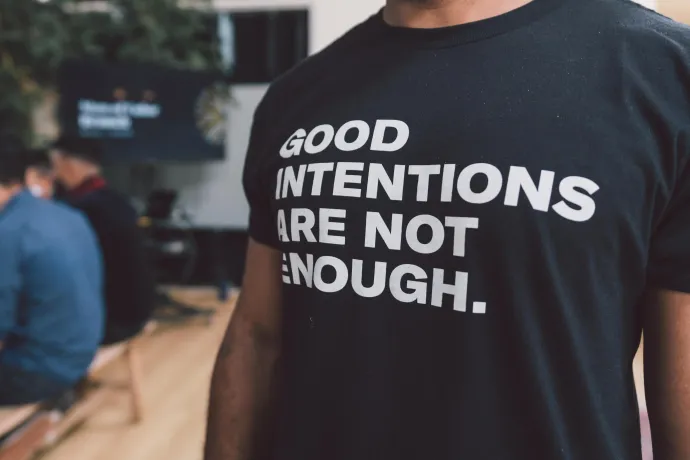Recognizing That MY Norm Isn’t THE Norm
Jared K. shares a story of getting pulled over by a police officer and imagines what the experience might have been like if he weren’t a white male.
It’s 10:45pm. I drive away from the soccer complex where I just played two games. I’m sore and tired, chugging a bottle of Gatorade. I’ve driven this route hundreds of times, so I’m on autopilot as I navigate through the dark streets.
I turn the corner and see a police car’s flashing lights. What have I done? Speeding? On my phone? My registration sticker is current. No busted taillight. I always use my signal. I struggle to identify the infraction. I drive down a road with no shoulder for half a mile, looking for a place to pull over. I finally turn onto a side street, into a small subdivision.
I squint my eyes to avoid the glare of the officer’s headlights. I think about the last time I got a ticket – for speeding, fifteen years ago. I remember the large fine. And I remember the tedious online course I had to pass to keep my insurance rates unchanged. As the officer walks to my window, I wonder if I’ll have to go through that again.
The standard: “License and registration.” I reach into my glove box and pull out my registration. My driver’s license is in my bag in the backseat. Is it okay to reach and grab it? He says yes. He is firm, but also patient, as I dig for my wallet.
He shines his flashlight at my documents. I squint again and turn away. He still hasn’t told me why he pulled me over. I notice that I’m nervous. Should I ask him, or should I wait for him to tell me?
I’m a white male driving a reasonably nice car. I’m not perceived to be a threat. I’m safe. I’m a good guy. I’m innocent until proven guilty.
“Where are you coming from?”
“The soccer complex.”
“Did you win?” He smiles, not unfriendly.
“It was the playoffs. We won the first game, but we lost the finals.”
“Well, at least you won one game. That’s not bad.”
“True.”
No transition. “Did you see the stop sign at that intersection?”
I probably did, but I don’t remember. Did I roll through it? I must have; why else did he stop me? What do I say? I saw it, but I ignored it. Or, I didn’t know there was a stop sign. Nothing I say would sound good. A ticket is inevitable.
I finally mumble, “I don’t remember. If I ran the stop sign, I’m sorry.”
It’s a lame rebuttal, but it’s all I’ve got. He lectures me about how stop signs protect pedestrians, and it’s dark, and what if. . . I agree with everything he says. All I can think about is the cost and hassle of the ticket and my insurance rates.
“Do me a favor, Jared. When you’re in our town, make sure you stop at all stop signs. We’d hate for anyone to get hurt. Have a good night.” He hands me back my license and registration and returns to his car.
That’s it. No ticket. Just a warning, with a somewhat friendly conversation. I breathe a sigh of relief. I drive back home, stopping at every stop sign.
Not once did I feel physically threatened. The officer did not get aggressive with me. I was not disrespected. I didn’t fear an altercation.
And here’s the point: not once did I feel physically threatened. The officer did not get aggressive with me. I was not disrespected. I didn’t fear an altercation. The worst thing that could’ve have happened was getting a ticket.
I’m a white male driving a reasonably nice car. I’m not perceived to be a threat. I’m safe. I’m a good guy. I’m innocent until proven guilty, and even when I’m guilty I get off without punishment or consequences. It would be easy to believe that this reality is everyone’s reality – that sometimes you get a nice police officer who lets you off the hook.
But that would be naïve. Boys and men of color in America are up to 2.5 times more likely to be killed by police officers than white men and boys. It’s very likely that a black man, for example, in my exact situation would not be treated as I was; he would not be seen as non-threatening; and would not be been seen as innocent until proven guilty. My same friendly police officer would very likely treat a black man much differently, which could lead to unnecessary force and dire consequences. A black man would be thinking about those dire consequences, and not about the cost of a ticket.
I, as a white man in America, live a very different reality than a black man in America, or a gay man in America, or a transgender woman, or a person with disabilities, or an undocumented immigrant, or a veteran, or any other person who has one or more marginalized identities that I don’t have. This is reality. This is truth. These are the facts.
This matters because we all bring our different lived experiences to work each day. How can we not? We’re all human beings, with emotions and feelings and relationships that shape our perspectives and abilities to focus.
I, as a white man in America, live a very different reality than a black man in America.
If we want to sustain inclusive cultures where everyone feels like they belong and can bring their whole selves to work and thrive, each one of us has to be willing to suspend judgment, validate the lived experiences of others, and attempt to see the world through the lens of people who are different than us.
Conversely, when we believe that our norm is the norm, we jeopardize the psychological safety of those who don’t share our norm. We limit potential, we stifle innovation, we obliterate motivation, and we hamper creativity.
That officer was nice to me. He let me off. I’m grateful to him. It’s my role as an inclusive leader to recognize and respect the reality that not everyone else would have been so fortunate.








We encourage you to share your thoughts on your favorite social platform.